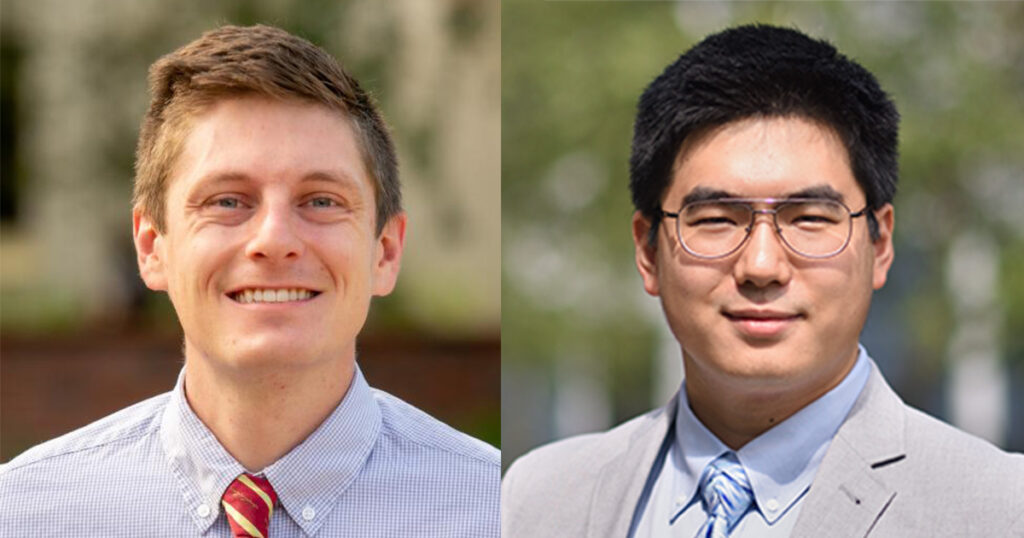Five alumni from the Department of Industrial and Systems Engineering (ISE) who graduated within the last four years are now assistant professors at other universities around the country.
“I feel very proud of all my students,” said Associate Professor and Heath Endowed Faculty Fellow Anahita Khojandi. “However, choosing to join academia requires an additional sense of curiosity, pursuit of discovery, and eagerness to train the next generation.”
Two of Khojandi’s recent students are now assistant professors—Zeyu (Louis) Liu (’22) at West Virginia University and Matthew Baucum (’21) at Florida State University. Professor and Dan Doulet Faculty Fellow Xueping Li, who co-advised Liu, agrees that there is something special about seeing former students secure faculty positions at peer institutions.
“Witnessing their growth from curious students to distinguished scholars affirms not only their hard work and dedication, but also the strength of UT’s ISE program in preparing the next generation of leaders, innovators, and educators,” Li said. “It is a true privilege to have played a part in this process.”
Khojandi and Li reflected on the qualities of the UT ISE program, and their personal teaching philosophies, that they think contribute most to the high proportion of hired faculty in ISE’s recent alumni classes.
What unique aspect of the ISE department prepares graduate students for faculty positions, where they conduct original research and lead other scientists?
Khojandi: We have a very strong curriculum, with courses that provide our students with a strong foundation in the ISE toolbox and also expose them to high-impact societal problems that require the attention of the next generation. In addition, we have student chapters of professional societies that allow students to build a community and learn from each other. We also have many opportunities for our students to interact with other researchers, including student chapters of professional societies that create a stronger ISE community and our weekly seminar series, class projects, and sponsored projects that let them interact with researchers at other institutions.
Li: Our curriculum integrates real-world problem solving and encourages interdisciplinary collaboration, which challenges students to think beyond conventional boundaries and equips them with the ability to innovate and lead in their chosen fields.
What research skills do you cultivate in your graduate students?
Khojandi: I encourage my students to become deeply knowledgeable about their problem of interest, but to keep in mind the broader impacts that we want our solutions to have. Overall, I would like to train students to be well-rounded: to have strong theoretical backgrounds but push the boundaries to solve some of the most pressing issues that our society faces in the near future.
Li: We emphasize a broad spectrum of research skills tailored to the evolving demands of industry and academia, including systems thinking, data analytics, and critical literature review. We also encourage our students to engage in research that not only advances theoretical knowledge but also has practical applications, thereby fostering a balance between theory and practice.
What teaching skills do you emphasize and cultivate in your graduate students?
Khojandi: I emphasize written and oral communication and give my students plenty of opportunities to learn by doing. I hold group meetings in my lab in which students take turns presenting their research at various stages of progress, which gives them routine practice explaining difficult concepts in approachable language. It also helps them learn how to give and receive constructive feedback. I also invite my students to my classes as guest speakers, putting their instructional skills to the test as they interact with other students in a formal class setting.
Li: Our department gives graduate students experience teaching in multiple formats and familiarizes them with innovative educational technologies. We also stress the importance of empathy and understanding diverse student needs, preparing our graduates to foster inclusive and supportive learning environments that cater to a wide range of learning styles and backgrounds.
Recent ISE Alumni in Faculty Positions
| ISE Alum | Year of PhD Conferral | UT Advisor(s) | Current Position | Current Research |
| Matthew Baucum | 2021 | Anahita Khojandi | Assistant professor at the College of Business, Florida State University | Machine learning and sequential decision-making models applied to healthcare |
| Tanveer Hossain Bhuiyan | 2022 | Hugh Medal | Assistant professor at the Klesse College of Engineering and Integrated Design, University of Texas at San Antonio | Data-driven mathematical models and solution algorithms applied to decision-making problems under uncertainty |
| Wenquan Dong | 2023 | Mingzhou Jin | Assistant professor at the Ingram School of Engineering, Texas State University | Sustainable manufacturing and automated storage and retrieval for closed-loop supply chains |
| Zeyu Liu | 2022 | Anahita Khojandi, Xueping Li | Assistant professor at the Benjamin M. Statler College of Engineering and Mineral Resources, West Virginia University | Optimization under uncertainty, data-driven analytics, reinforcement learning, and agent-based simulation |
| Jianxin Xie | 2023 | Bing Yao | Assistant professor at the School of Data Science, University of Virginia | Advanced machine learning and data analytics tools applied to healthcare and engineering problems |
Contact
Izzie Gall (865-974-7203, egall4@utk.edu)
